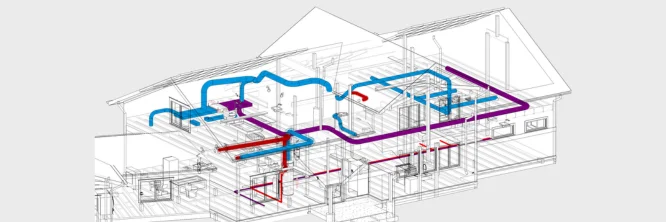Índice
An HVAC system, short for heating, ventilation, and air conditioning, is a complex network of components designed to provide comfortable indoor environments. The parts of an HVAC system work together to regulate temperature, humidity, and air quality. Whether it's a chilly winter day or a sweltering summer afternoon, your HVAC system ensures your home or office remains at a comfortable temperature. In this article, we will explore the key components of an HVAC system, their functions, and how they contribute to a healthy and comfortable indoor environment.

An HVAC system is a technology that regulates the temperature and humidity within a building. It does this by controlling the circulating air and removing excess moisture or heat. HVAC systems are essential for maintaining indoor comfort and air quality.
Key elements of HVAC systems
The components of an HVAC system can vary depending on the specific type of system and its size. However, most HVAC systems share common elements:
Air conditioning systems use a refrigeration cycle to cool the air. The refrigerant, a special type of fluid, undergoes a series of changes in pressure and temperature as it circulates through the system. The evaporator coil absorbs heat from the indoor air, causing the refrigerant to evaporate. The refrigerant vapor is then compressed, which increases its temperature and pressure. The hot, high-pressure refrigerant is then passed through the condenser coil, where it releases heat to the outdoors. The refrigerant then changes back to a liquid and the cycle repeats.
There are many different types of HVAC systems available, including:
If you're interested in a career in the trades, becoming an HVAC technician can be a rewarding choice. HVAC technicians are in high demand, and the work can be both Job security: The demand for skilled HVAC technicians is expected to grow in the coming years.
Proper maintenance is essential for keeping your HVAC system running efficiently and effectively. Here are some tips for caring for your HVAC system:
Energy efficiency is a growing concern for homeowners and businesses. HVAC systems can consume a significant amount of energy, particularly during peak heating and cooling seasons. However, there are several strategies to improve the energy efficiency of your HVAC system:
Installing an HVAC system is a complex task that should be left to professionals. A properly installed HVAC system will operate more efficiently and be less likely to experience problems. When choosing an HVAC contractor, be sure to ask about their experience, licensing, and certifications.
If your HVAC system is not working properly, there are a few common problems that you can try to diagnose and fix yourself. Some common HVAC problems include:
If you are unable to resolve the problem yourself, it is important to call a professional HVAC technician for assistance.
An HVAC system is a complex network of components that work together to provide comfortable indoor environments. By understanding the parts of an HVAC system and their functions, you can better appreciate the technology that keeps you comfortable. Regular maintenance and care will help ensure your HVAC system operates efficiently for years to come.

¡Muchas gracias!
Hemos recibido correctamente tus datos. En breve nos pondremos en contacto contigo.